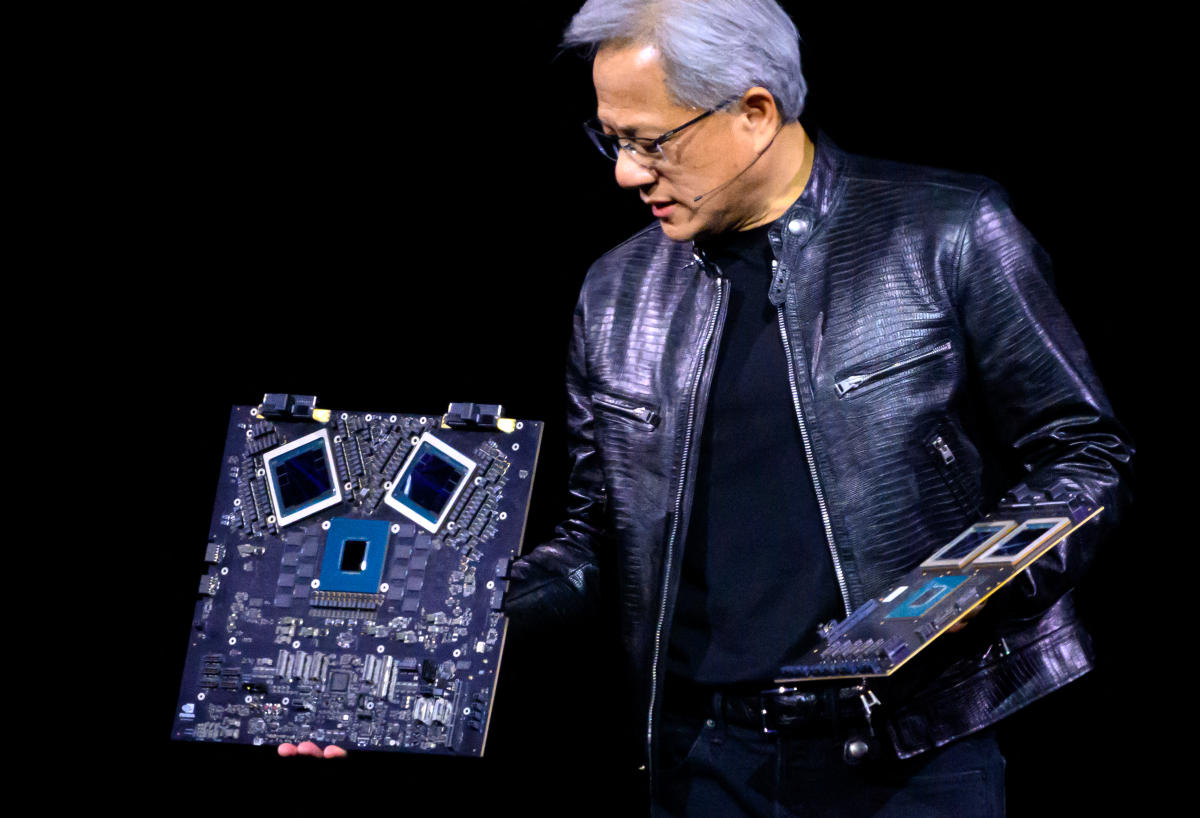Nvidia (NVDA) CEO Jensen Huang doesn’t lack demand. What he lacks is supply.
In an exclusive interview with Yahoo Finance following the company’s first quarter earnings report Wednesday, Huang pushed back against concerns the company could face a demand lull as it shifts between its current and next generation of AI chips.
“People want to deploy these data centers right now,” Huang said. “They want to put our [graphics processing units] to work right now and start making money and start saving money. And so that demand is just so strong.”
Nvidia is transitioning from its current Hopper AI platform to its more advanced Blackwell system. Ahead of the company’s results on Wednesday, some analysts on Wall Street had raised questions about whether some customers would be more cautious with Hopper orders ahead of the more Blackwell units later this year.
“Hopper demand grew throughout this quarter — after we announced Blackwell — and so that kind of tells you how much demand there is out there,” Huang said.
Huang added that demand for both platforms will outstrip supply well into next year, with the complexity of these chips also challenging the company’s efforts to keep pace.
“Every component, every part of our data center, is the most complex computer the world’s ever made,” Huang said. “And so it’s sensible that almost everything is constrained.”
For the first quarter, Nvidia reported results that topped Wall Street forecasts, with adjusted earnings per share reaching $6.12 on revenue of $26 billion, a 461% and 262% jump from the prior year, respectively. Non-GAAP operating income tallied $18.1 billion in the first quarter.
In the current quarter, Nvidia expects revenue to reach $28 billion plus or minus 2%. That’s better than the $26.6 billion analysts had expected.
The company also announced a 10-to-1 stock split — in which shareholders will receive 10 shares for every one share of the company they currently own — that will go into effect June 10 for shareholders as of June 7.
Nvidia also joined its Big Tech peers in boosting its quarterly dividend, with shareholders now set to receive a dividend of $0.10 per share, up from $0.04.
Nvidia stock rose as much as 6% in extended trading on Wednesday.
Huang also discussed how Nvidia will navigate the transition from AI training, in which companies train AI models, to AI inferencing, where those same companies deploy models for customers to use.
Questions have swirled about whether large-scale cloud providers like Microsoft (MSFT), Google (GOOG, GOOGL), and Amazon (AMZN) would drop Nvidia’s chips for inferencing in favor of their own offerings.
But Huang sees Nvidia’s offerings being just as powerful for inference as they are for training.
“We have a great position in inference, because inference is just a really complicated problem,” he said.
“The software stack is complicated. The type of models that people use is complicated. The vast majority of inferencing today is done on Nvidia. And so, we expect that to continue.”
The CEO also touched on the growth the company is seeing in sales to customers beyond major cloud service providers like Amazon, Microsoft, and Google, saying that companies ranging from Meta (META) and Tesla (TSLA) to pharmaceutical firms are increasingly buying up Nvidia chips. In fact, the biggest industry using Nvidia’s data-center chip, excluding the cloud companies. is automotive.
“Tesla is far ahead in self-driving cars,” Huang said. “But every single car, someday we will have to have autonomous capability.”
Click here for the latest technology news that will impact the stock market.
Read the latest financial and business news from Yahoo Finance









